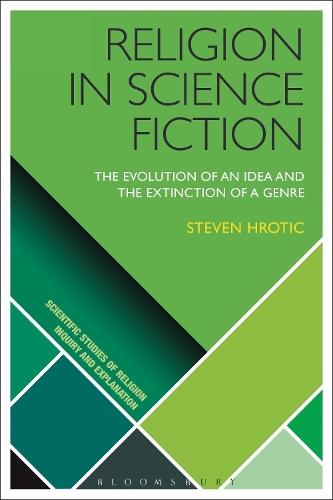Overview
Religion in Science Fiction investigates the history of the representations of religion in science fiction literature. Space travel, futuristic societies, and non-human cultures are traditional themes in science fiction. Speculating on the societal impacts of as-yet-undiscovered technologies is, after all, one of the distinguishing characteristics of science fiction literature. A more surprising theme may be a parallel exploration of religion: its institutional nature, social functions, and the tensions between religious and scientific worldviews. Steven Hrotic investigates the representations of religion in 19th century proto-science fiction, and genre science fiction from the 1920s through the end of the century. Taken together, he argues that these stories tell an overarching story—a ‘metanarrative’—of an evolving respect for religion, paralleling a decline in the belief that science will lead us to an ideal (and religion-free) future. Science fiction’s metanarrative represents more than simply a shift in popular perceptions of religion: it also serves as a model for cognitive anthropology, providing new insights into how groups and identities form in a globalized world, and into how crucial a role narratives may play. Ironically, this same perspective suggests that science fiction, as it was in the 20th century, may no longer exist.
Full Product Details
Author: Steven Hrotic (University of Vermont, USA)
Publisher: Bloomsbury Publishing PLC
Imprint: Bloomsbury Academic
Dimensions:
Width: 15.60cm
, Height: 1.80cm
, Length: 23.40cm
Weight: 0.517kg
ISBN: 9781472533555
ISBN 10: 1472533550
Pages: 240
Publication Date: 31 July 2014
Audience:
College/higher education
,
Postgraduate, Research & Scholarly
Format: Hardback
Publisher's Status: Active
Availability: Manufactured on demand

We will order this item for you from a manufactured on demand supplier.
Reviews
This book teaches you not only about the important role writers of science fiction play in leading us to novel insights into religion, but also about the relationship between scientific and religious approaches to the world-and especially the usefulness of cognitive science in explaining the life of the imagination. -- E. Thomas Lawson, Editor, Journal of Cognition and Culture A delightful read that fills a much needed gap in the study of religion's occasionally ambiguous relationship with science fiction. Hrotic takes us on a lovely ride through a wide variety of imagined futures. Highly recommended. -- Douglas E. Cowan, Professor of Religious Studies and Social Development Studies, Renison University College at University of Waterloo, Canada I started reading Religion in Science Fiction with the intention to review it - and ended up just devouring the book. Hrotic's study is a learned, intelligent, often original, and highly readable contribution to research; in short: unputdownable. -- Susanne Bach, Department for English and American Studies, University Kassel, Germany Religion is a major preoccupation of science fiction, though this has not always been acknowledged. Steve Hrotic has constructed a persuasive narrative about the different ways in which genre SF writers have approached religion, considered primarily as a special type of social system. -- Rowland Wymer, Professor of English, Anglia Ruskin University, Cambridge, UK
This book teaches you not only about the important role writers of science fiction play in leading us to novel insights into religion, but also about the relationship between scientific and religious approaches to the world-and especially the usefulness of cognitive science in explaining the life of the imagination. -- E. Thomas Lawson, Editor, Journal of Cognition and Culture
This book teaches you not only about the important role writers of science fiction play in leading us to novel insights into religion, but also about the relationship between scientific and religious approaches to the world-and especially the usefulness of cognitive science in explaining the life of the imagination. -- E. Thomas Lawson, Editor, Journal of Cognition and Culture A delightful read that fills a much needed gap in the study of religion's occasionally ambiguous relationship with science fiction. Hrotic takes us on a lovely ride through a wide variety of imagined futures. Highly recommended. -- Douglas E. Cowan, Professor of Religious Studies and Social Development Studies, Renison University College at University of Waterloo, Canada I started reading Religion in Science Fiction with the intention to review it - and ended up just devouring the book. Hrotic's study is a learned, intelligent, often original, and highly readable contribution to research; in short: unputdownable. -- Susanne Bach, Department for English and American Studies, University Kassel, Germany Religion is a major preoccupation of science fiction, though this has not always been acknowledged. Steve Hrotic has constructed a persuasive narrative about the different ways in which genre SF writers have approached religion, considered primarily as a special type of social system. -- Rowland Wymer, Professor of English, Anglia Ruskin University, Cambridge, UK Hrotic's disciplinary standpoint as a cognitive anthropologist, as opposed to a literary critic or philosopher, marks his intervention as usefully distinct from our field's usual patterns of inquiry; the approach is quite different from what we usually do, and quite usefully so, and the book surely worth reading. -- Gerry Canavan, Marquette University Science Fiction Studies
This book teaches you not only about the important role writers of science fiction play in leading us to novel insights into religion, but also about the relationship between scientific and religious approaches to the world-and especially the usefulness of cognitive science in explaining the life of the imagination. -- E. Thomas Lawson, Editor, Journal of Cognition and Culture A delightful read that fills a much needed gap in the study of religion's occasionally ambiguous relationship with science fiction. Hrotic takes us on a lovely ride through a wide variety of imagined futures. Highly recommended. -- Douglas E. Cowan, Professor of Religious Studies and Social Development Studies, Renison University College at University of Waterloo, Canada
Author Information
Steven Hrotic is a cognitive anthropologist, currently teaching and writing at the University of Vermont, USA.




